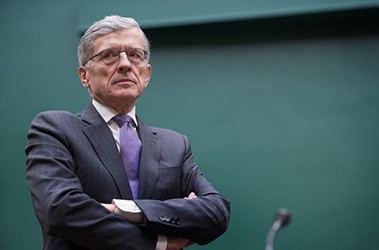The New Yorker: Tim Wu on Net Neutrality: This changes the whole game
Why yesterday's big net neutrality win shows that people power can create change. Article by Tim Wu for The New Yorker Today, the Federal Communications Commission, by a vote of three to two, enacted its strongest-ever rules on net neutrality, preserving an open Internet by prohibiting broadband providers from blocking or slowing content that flows across their pipes. It is a substantial achievement for the Obama Administration and the F.C.C. chairman Tom Wheeler, and also for the many groups that fought hard for the outcome. But it also is a moment to reflect back on the process over the last year that led here, and figure out why what so many people thought they knew turned out to be wrong.
Why yesterday's big net neutrality win shows that people power can create change.
Article by Tim Wu for The New Yorker
Today, the Federal Communications Commission, by a vote of three to two, enacted its strongest-ever rules on net neutrality, preserving an open Internet by prohibiting broadband providers from blocking or slowing content that flows across their pipes. It is a substantial achievement for the Obama Administration and the F.C.C. chairman Tom Wheeler, and also for the many groups that fought hard for the outcome. But it also is a moment to reflect back on the process over the last year that led here, and figure out why what so many people thought they knew turned out to be wrong.
Let’s begin with the most obvious incorrect prediction, namely that passage of a strong rule (a Title II rule in telecom jargon) would be politically impossible. A year ago, Kevin Werbach, a thoughtful and prominent analyst, predicted that “the political and marketplace costs” of strong net-neutrality rules would be just “too great.” He warned, among other things, that Congress would “grind the FCC to a standstill, starve its budget, and do everything in their power to inflict permanent harm on the agency.”
Werbach’s point was echoed by political cynics who believe that federal regulatory agencies like the F.C.C. tend to become captured and obey the bidding of whoever spends the most to lobby them. Money was certainly not on the side of net neutrality. A.T. & T., Verizon, Comcast, and others opposed strong net-neutrality rules, while the richest potential allies, companies like Google and Facebook, mostly sat things out. Some of the only groups in favor of strong rules were little-known activist organizations like Fight for the Future, Demand Progress, and Free Press; a few startups like Tumblr and Kickstarter; a handful of academics dabbling in public policy; and the narrow segment of the public who actually pays attention to such things. Given that lineup, the outcome seemed about as preordained as what happened when Michael Spinks stepped into the ring with Mike Tyson.
- Read more at The New Yorker


 Take action now!
Take action now!
 Sign up to be in the loop
Sign up to be in the loop
 Donate to support our work
Donate to support our work